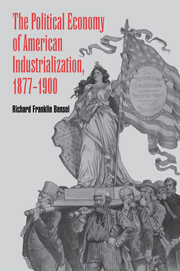Book contents
- Frontmatter
- Contents
- List of Tables
- List of Maps and Charts
- Preface
- Chapter 1 Introduction
- Chapter 2 Uneven Economic Development in the United States
- Chapter 3 Platform Demands, Party Competition, and Industrialization
- Chapter 4 Claims on Wealth and Electoral Coalitions
- Chapter 5 Political Construction of the National Market
- Chapter 6 Political Administration and Defense of the Gold Standard
- Chapter 7 Tariff Protection and the Republican Party
- Chapter 8 Conclusion
- Index
Chapter 8 - Conclusion
Published online by Cambridge University Press: 27 March 2010
- Frontmatter
- Contents
- List of Tables
- List of Maps and Charts
- Preface
- Chapter 1 Introduction
- Chapter 2 Uneven Economic Development in the United States
- Chapter 3 Platform Demands, Party Competition, and Industrialization
- Chapter 4 Claims on Wealth and Electoral Coalitions
- Chapter 5 Political Construction of the National Market
- Chapter 6 Political Administration and Defense of the Gold Standard
- Chapter 7 Tariff Protection and the Republican Party
- Chapter 8 Conclusion
- Index
Summary
The political economy of American industrialization carries two very different implications for comparative development, one economic and the other political. In economic terms, development must attract and retain capital – a requirement that usually demands fairly high rates of return and a disciplined focus on productive efficiency. In the American case, given the conservative ideological orientation of the industrial and financial elite, deciding what public policies might provide these conditions was rather simple: An unregulated national market provided the impetus to technological innovation (and thus productivity), while adherence to the gold standard guaranteed that the resulting profits would not be impaired by inflation or exchange rate instability. Because the political agent for constructing these policies became the Republican party, the political viability of industrialization depended to a large extent on the party's electoral success. Viewed in economic terms, the national market and the gold standard were the most fundamental developmental policies; viewed politically, the tariff was far more central to development because protection underpinned the Republican coalition.
From a comparative perspective, the important point is that successful developmental programs must be both economically and politically viable; because both conditions must be met, scholars cannot choose between them. This was particularly evident in the United States because the political and economic preconditions for industrialization were so distinct. On the one hand, there was an economic process that required a national market and monetary stability.
- Type
- Chapter
- Information
- The Political Economy of American Industrialization, 1877–1900 , pp. 510 - 528Publisher: Cambridge University PressPrint publication year: 2000



